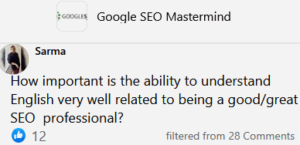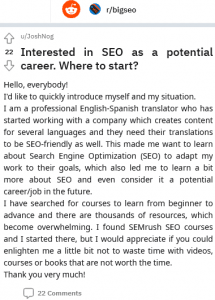Thomas
Question about International SEOs:
How do you manage with totally different languages like Japanese?
[filtered from 28 💬🗨]
Davis
Best to have a local Seo in such cases. We are working with one of our clients for Arabic language. They have a translator on board and we are still figuring things out but if you don’t know the language, doing SEO for it gets a way lot harder.
👍1
If it's a european language, no problem there just need a content person. Character based language like Japanese is really tricky, but also Google hasn't advanced enough there so you can get away with 2011 SEO strategies. You'd need a local content person or even better a language student/teacher and tell them: this is the keyword density, this is the anchor text that you need to use for internal linking etc. My biggest problem was in link building. Also, Google Translate is pretty great and will help a lot.
👍2
Best to have a local Seo in such cases. We are working with one of our clients for Arabic language. They have a translator on board and we are still figuring things out but if you don’t know the language, doing SEO for it gets a way lot harder.
👍1
Thomas ✍️
But if you are the SEO that handles a new market with such a language, it doesn't make sense to hire another local SEO. Maybe a content writer who speaks the language is all you need?
👍1
Davis » Thomas
yes you could have a content writer that does the translations but when it comes to keyword research, local competition analysis and link building, that is where the real challenge comes in. At least that is where we see challenges when working on a language that is alien to us. Technical Seo is a lot more straightforward but there areas are difficult to execute unless you know the language and local terms used.
Thomas ✍️ » Davis
can u elaborate more about this? How difficult is for someone with experience in English-speaking websites to start doing SEO & PPC on Japanese pages? How do u need to adjust your daily tasks?
Davis » Thomas
that brings me back to my original point. You need to have a local SEO who has an understanding of the language to work on the non technical aspects. What we do at present is co ordinate with their writer to do the keyword research in the local language, they share with us the translated version in English and we then select the important keywords and have given them training on how to create the metas. They do so but we still find it difficult in evaluating if the metas they have created are optimal. PPC will be even more challenging.
We currently train the writers but we have already relayed onto the client that they need to get in a local SEO expert if they want to take this off because clearly our expertise is limited. As they don't want to do so at present, we just train their team on various SEO aspects and hope they are doing a good job of it.
👍1
Thomas ✍️ » Davis
I guess you are talking from an agency perspective, right? In my case we are talking for an inhouse SEO role that needs to handle the whole strategy for the Japanese and other foreign languages.
Davis
Yes I was speaking from an agency perspective. If you are having this person in house, then my suggestion would be have them co ordinate with the writer/translator. The translator essentially will need to take up a dual role of writer/marketer and you train them accordingly.
The only difference in our scenario is that the client has an inhouse translator and we as an agency are guiding her on how to do things.
In your case, I would say that the inhouse SEO can take care of the technical bits but for each language, you are much better off co ordinating with someone who knows the language. It would save a lot of time and would also be faster to execute with greater accuracy.
👍1
Thomas ✍️ » Davis
I really appreciate your feedback. thanks! 🙂
Davis » Thomas
no worries Thomas. Happy to help 🙂
MajaBut if you are the SEO that handles a new market with such a language, it doesn't make sense to hire another local SEO. Maybe a content writer who speaks the language is all you need?
👍1
Davis » Thomas
yes you could have a content writer that does the translations but when it comes to keyword research, local competition analysis and link building, that is where the real challenge comes in. At least that is where we see challenges when working on a language that is alien to us. Technical Seo is a lot more straightforward but there areas are difficult to execute unless you know the language and local terms used.
Thomas ✍️ » Davis
can u elaborate more about this? How difficult is for someone with experience in English-speaking websites to start doing SEO & PPC on Japanese pages? How do u need to adjust your daily tasks?
Davis » Thomas
that brings me back to my original point. You need to have a local SEO who has an understanding of the language to work on the non technical aspects. What we do at present is co ordinate with their writer to do the keyword research in the local language, they share with us the translated version in English and we then select the important keywords and have given them training on how to create the metas. They do so but we still find it difficult in evaluating if the metas they have created are optimal. PPC will be even more challenging.
We currently train the writers but we have already relayed onto the client that they need to get in a local SEO expert if they want to take this off because clearly our expertise is limited. As they don't want to do so at present, we just train their team on various SEO aspects and hope they are doing a good job of it.
👍1
Thomas ✍️ » Davis
I guess you are talking from an agency perspective, right? In my case we are talking for an inhouse SEO role that needs to handle the whole strategy for the Japanese and other foreign languages.
Davis
Yes I was speaking from an agency perspective. If you are having this person in house, then my suggestion would be have them co ordinate with the writer/translator. The translator essentially will need to take up a dual role of writer/marketer and you train them accordingly.
The only difference in our scenario is that the client has an inhouse translator and we as an agency are guiding her on how to do things.
In your case, I would say that the inhouse SEO can take care of the technical bits but for each language, you are much better off co ordinating with someone who knows the language. It would save a lot of time and would also be faster to execute with greater accuracy.
👍1
Thomas ✍️ » Davis
I really appreciate your feedback. thanks! 🙂
Davis » Thomas
no worries Thomas. Happy to help 🙂
If it's a european language, no problem there just need a content person. Character based language like Japanese is really tricky, but also Google hasn't advanced enough there so you can get away with 2011 SEO strategies. You'd need a local content person or even better a language student/teacher and tell them: this is the keyword density, this is the anchor text that you need to use for internal linking etc. My biggest problem was in link building. Also, Google Translate is pretty great and will help a lot.
👍2
John » Maja
did you ever tried to translate something from English and almost directly post it somewhere…how was google reaction for that article??… asking you out of curiosity, how deep you can go (get away with it)…(not planning something like that because I like “long run”, but sometimes small things are so handy just to translate and insert)…thank you.
Maja » John
No. Google translate goes only as far as you understanding the text. I would advise against using that for content writing hence my insistance on the content person.
🤔1
Thomas ✍️ » Maja
link building should be easier since Google is not so advanced in such languages. I am pretty sire that the link value will be very strong even from English .com domains, as long as there is some relevance, as Google doesn't apply so strict rules for these foreign languages.
👍1
John » Maja
yes, that’s all fine and thank you for advice… I was just wondering how was your experience, though you may have done some tests… thank you for your answer 👌
Maja » Thomas
yep. Remember link building in 2011. Pre Penguin. That's what you can get away with.
👍2
John » Thomas
you can basically do whatever you want, it’s still 2010 there, but I’m afraid if I push it to far, one day it may come back 🤷♂️… but yes, wild wild west 🥳
👍1
Maja » John
I wouldn't do that because who knows which language version I would trigger. For example Simplified chinese is used in Malaysia, and traditional in China. There are also shit ton of ways to spell something and Google's understanding of the word is pretty much search and exact match.
🤔1
John » Maja
thank you one more time, but here I'm talking about ′′ our ′′ language… (not sure where but we speak the same language)..
👍1
Maja » John
Feel free to ask me a direct question here then. Or let me know if you'd like me to elaborate on a point I made. Happy to help.
🤔1
John » Maja
honestly nothing special to add, I was following this post and when I saw your name and what you saying I was just curious what is your experience with all this, because you can can getaway with almost anything… I was thinking to test direct translation, few pages from some website and google translate and not to change anything (just to make it readable, what google didn’t translate properly) just to see how far I can go…because google doesn’t give a f. for some countries which are not “important” to him…
Maja » John
Test it. Why not. But I don't think it's a matter of importance. It's just that their algorithm relies a lot on language learning and they simply don't have enough people that surf in that language for the algorithm to advance to the level of english. However, I have seen some markets that do use english – such as South Africa, Malta and India and the SERPS are still not at the level of US so I guess it's about the pool of results as well.
🤔1
John » Maja
yes, my brain is going somewhere in that direction as well… that last part is interesting… thank you again for the time and explanations, you honestly helped me even with this one you shared 💝👌
👍1
did you ever tried to translate something from English and almost directly post it somewhere…how was google reaction for that article??… asking you out of curiosity, how deep you can go (get away with it)…(not planning something like that because I like “long run”, but sometimes small things are so handy just to translate and insert)…thank you.
Maja » John
No. Google translate goes only as far as you understanding the text. I would advise against using that for content writing hence my insistance on the content person.
🤔1
Thomas ✍️ » Maja
link building should be easier since Google is not so advanced in such languages. I am pretty sire that the link value will be very strong even from English .com domains, as long as there is some relevance, as Google doesn't apply so strict rules for these foreign languages.
👍1
John » Maja
yes, that’s all fine and thank you for advice… I was just wondering how was your experience, though you may have done some tests… thank you for your answer 👌
Maja » Thomas
yep. Remember link building in 2011. Pre Penguin. That's what you can get away with.
👍2
John » Thomas
you can basically do whatever you want, it’s still 2010 there, but I’m afraid if I push it to far, one day it may come back 🤷♂️… but yes, wild wild west 🥳
👍1
Maja » John
I wouldn't do that because who knows which language version I would trigger. For example Simplified chinese is used in Malaysia, and traditional in China. There are also shit ton of ways to spell something and Google's understanding of the word is pretty much search and exact match.
🤔1
John » Maja
thank you one more time, but here I'm talking about ′′ our ′′ language… (not sure where but we speak the same language)..
👍1
Maja » John
Feel free to ask me a direct question here then. Or let me know if you'd like me to elaborate on a point I made. Happy to help.
🤔1
John » Maja
honestly nothing special to add, I was following this post and when I saw your name and what you saying I was just curious what is your experience with all this, because you can can getaway with almost anything… I was thinking to test direct translation, few pages from some website and google translate and not to change anything (just to make it readable, what google didn’t translate properly) just to see how far I can go…because google doesn’t give a f. for some countries which are not “important” to him…
Maja » John
Test it. Why not. But I don't think it's a matter of importance. It's just that their algorithm relies a lot on language learning and they simply don't have enough people that surf in that language for the algorithm to advance to the level of english. However, I have seen some markets that do use english – such as South Africa, Malta and India and the SERPS are still not at the level of US so I guess it's about the pool of results as well.
🤔1
John » Maja
yes, my brain is going somewhere in that direction as well… that last part is interesting… thank you again for the time and explanations, you honestly helped me even with this one you shared 💝👌
👍1
Florine
Japanese don't do SEO 😅 just look at their websites or the fact Yahoo is the #1 portal in the country
🤭1
Joe
You need a local content team, a content plan and good systems.
Wages in Japan are high.
Links are also very expensive.
But if you set it up right it’s ok.
Helps if it’s a niche you know well and you’ve ranked in a language previously in a niche you are fluent in, as that helps with the content planning.
👍3
This may satisfy you: Does a Client Have to Transfer the Client’s Site Into the Panel of the SEO Marketing Agency?
Embed the link of this post





